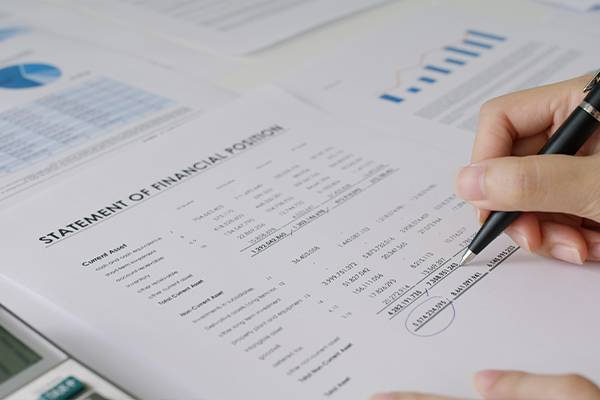With millions of certified businesses across Australia, bookkeepers are in demand now more than ever. If you have a passion for finance and an eye for detail, a career in bookkeeping can be a rewarding choice.
Bookkeeping serves a vital role within small businesses and larger organisations, primarily for its skills in recording financial activity and maintaining accuracy. While you don’t technically need to be certified to become a bookkeeper, completing a certificate at TAFE Gippsland will ensure you are best prepared to enter the workforce with advanced skills. Through TAFE, you can also add further qualifications to your resume by becoming a BAS agent, to help you further stand out from the crowd. Finally, bookkeeping can also open the door to greater professional freedom, with the possibilities of transforming your career into your business.

What is a bookkeeper?
Bookkeepers are an important financial position within any company. They are responsible for recording and managing financial accounts, ensuring they are both up-to-date and accurate. Once upon a time, bookkeepers used physical ledgers, pencils and calculators. Today, they make the most of modern software for more accurate reporting than ever before.
They are essentially at the centre of a business's finances, monitoring every transaction, collecting data, and keeping an eye out for any irregularities. Money is an integral part of any company, and bookkeepers are the ones entrusted with managing it.

What does a bookkeeper do?
Although the exact responsibilities of a bookkeeper will largely depend on the business you work for, your tasks and duties will generally include:
- Recording financial transactions - Systematically logging transactions into the general ledger as a way to ensure you understand where the money is coming in and out of a business. This can also prevent any potential fraud and assist with gathering information for further financial statements and tax returns.
- Create reports - Reports can be crafted by bookkeepers to display a company's financial situation. They can be presented as a balance sheet, cash flow statements or even a chart.
- Accounts payable - Refers to keeping track of debt. Will involve planning a payment strategy that lands within a business's budget while also making sure bills are paid on time.
- Accounts receivable - The opposite of accounts payable. Ensuring that payments owed to the businesses are followed up on and paid.
- Processing employee payroll - Bookkeepers will often be responsible for the employee payroll, ensuring timely payments while also managing tax deductions.
- Ensuring financial records are accurate - Analysing all of a business's financial records, including transactions, payments and bank deposits for potential inaccuracies.
- Reconciling all balance sheet accounts - A bookkeeper ensures accuracy through balance sheet reconciliation. Refers to when you compare account balance sheet figures with the general ledger to check for discrepancies between the two.

What skills does a bookkeeper need?
Before you launch your career, it is important to understand some of the practical skills to develop in order to perform your duties. The following is a list of skills that will help you to become a successful bookkeeper.
- Mathematics - You will deal directly with financial information and numbers. Anyone with an already developed understanding or passion for mathematics will be highly valued.
- Computer literacy - With the world of financial management heavily digitised, a knowledge and understanding of computer literacy is integral. Through completing your certificate or your training, it’s essential to understand modern bookkeeping software. These can include, but are not limited to: Xero, MYOB and QuickBooks.
- Analytical thinking - Bookkeepers must develop the skill to spot discrepancies, errors and inconsistencies. This analytical way of analysing financial data will be an important attribute to develop as a bookkeeper.
- Problem solving - Managing finances will not always be straightforward. Having the skills to find logical solutions to any issues will be crucial as a bookkeeper.
- Effective communication - It’s important for bookkeepers to maintain effective communication with coworkers to ensure all financial transactions are monitored. Communication is not just verbal; having effective written skills is also equally useful for interacting with others.
- Time management - With a variety of different tasks to juggle at once, effective time management skills will ensure you can balance your duties equally without making mistakes.
How to become a bookkeeper
If you want to put yourself in the best position before entering the workforce, we strongly suggest that you complete a relevant qualification. Taking on a course such as the Certificate IV in Accounting and Bookkeeping at TAFE Gippsland will ensure you are provided with all of the most up-to-date, practical training before you graduate. This is a 16-month course that will prepare you for the start of your bookkeeping career. Once you earn your certificate, you will gain the necessary knowledge needed to enter the financial sector. This course is conducted completely online, which makes it perfect for anyone looking to manage their work and other responsibilities while studying.
Throughout the 16 months, you will gain practical skills in using accounting software, spreadsheets and other technology. You will also develop an understanding of the daily responsibilities of a bookkeeper, growing a knowledge of double-entry accounting, financial reporting requirements and GST compliance. This course is a nationally recognised qualification and has no specified requirements for entry. Upon successful completion, you will be eligible to receive the Certificate IV in Accounting and Bookkeeping.
How to become a BAS agent
Once you complete your certificate, you are now ready to enter the workforce as a bookkeeper. However, if you want to further enhance your resume, becoming a qualified Business Activity Statement (BAS) agent is a fantastic step.
A BAS agent is a bookkeeper who is trained to take on more responsibility. While bookkeepers generally cannot advise on matters relating to the Australian Tax Office (ATO), a BAS agent is uniquely qualified to assist businesses with handling the ATO. Although it requires more training, becoming a BAS agent can further unlock your career potential and typically results in both a greater salary and a higher hourly rate for freelancers.
To become a fully registered BAS Agent, you will need to complete the following steps.
- Complete 1,400 hours of relevant work experience - The first step in becoming an agent is completing your relevant work experience. Experience can be a volunteering position or a full-time role after finishing your certificate. It’s important that all relevant hours are logged to make sure it qualifies to move on to the next step.
- Apply to the Tax Practitioners Board - Bookkeepers must then apply to the Tax Practitioners Board, where you will have to demonstrate your understanding of business activity statements (BAS) and the goods and services tax (GST). No need to be concerned, though; both will be covered under your TAFE certificate.
- Professional Indemnity (PI) insurance - The final step in the process is required by all BAS agents. They must follow a code of professional conduct, which includes adhering to a Professional Indemnity (PI) Insurance. This PI insurance protects bookkeepers when their clients and businesses are affected by their negligence or error.
Bookkeeping vs accounting
On the surface, bookkeepers perform a similar function to accountants. Although they are both important cogs in the financial industry, they have very key differences. While a bookkeeper's role is to manage a business's finances, making sure they are both accurately recorded and up-to-date, an accountant’s role is to provide strategic advice.
Working as an accountant is generally more subjective than bookkeeping, requiring you to analyse data, not just record it. Accounting is a varied field, but often involves crafting reports and forecasts that can be used to advise clients on potential financial strategy and budgeting. Think of the bookkeeper as a business's financial administrator, while an accountant provides advice and strategic planning for the future.
While people in bookkeeping can secure a job with no formal training or just a certificate, accountants are generally required to earn at least a university bachelor's degree in formal training. It is important to mention that within the modern age, the line between accountants and bookkeepers is increasingly blurred. Many bookkeepers can offer a range of similar services to accountants, including consultancy and financial advice.
Bookkeeper salary
Bookkeeping, like accounting, is an in-demand career field, highly valued by businesses today and has a promising earning potential. Within Australia, bookkeepers can expect to make an average salary of $77,500 per year, or $39.74 per hour. When you are starting out, you could expect a salary of $68,000. Within a few years of experience, this could increase to up to $90,000 per year, or $43.27 per hour. Salaries will depend largely on your level of experience, personal arrangements and your location within Australia.
How to become a freelance bookkeeper
Developing your career in bookkeeping can open several doors toward greater independence and freedom. Becoming a contract bookkeeper or freelancer can be a great opportunity for experienced workers, allowing you to create your own business while still serving other clients. Working as a contractor gives you personal autonomy to set your own schedule, or even work from home, for an equally rewarding career.
To become a freelance bookkeeper, you will likely need to follow these steps.
- Check your education - Make sure you're aware of your qualifications. Beyond your TAFE certificate, if you want to work on BAS-related services and more complex bookkeeping tasks, you must be a registered BAS agent. Please refer to our prior section on becoming a registered BAS agent for more information.
- Earn enough experience - Generally, if you want to freelance, you will need to have an already developed list of businesses or professionals who can start offering your services to. Having an established portfolio at the start of your freelance career can provide valuable stability from the outset.
- Getting an ABN - As a contractor, if you want to work with different businesses, you’ll need to verify yourself with an ABN. An ABN can be arranged by following the steps here.
- Set your price - It will be important to research bookkeeping in your area and establish your market rate. Also important to consider other costs, such as office rent, software expenditure, taxes and your salary. Freelancers are commonly paid by the hour, with an average rate in Australia of between $35- $80. As you gain more experience as a freelancer, these rates can continue to grow.
- Market yourself - Arguably, the most valuable step toward entering the freelancing industry is understanding the ways you can market yourself. Anything that can increase word of mouth and make more businesses aware of your services is good marketing. Basic business cards to professional websites and social media profiles can be a great way to add credibility and to keep your client base growing.
Becoming a fully qualified bookkeeper can be a lengthy process, but with their services fully in demand now, it’s never too late to pursue. Particularly if you have an eye for finance and love the process of managing money, a job as a bookkeeper can be an incredibly rewarding career. By understanding the steps to becoming a fully qualified bookkeeper and the necessary skills and experience, you can ensure you’ll hit the ground running. If you would like to find out more, please contact TAFE Gippsland or visit our course information page on becoming a bookkeeper.